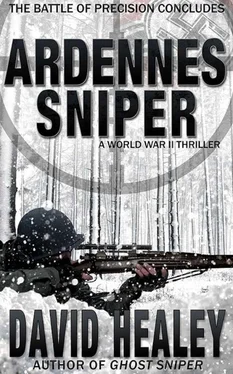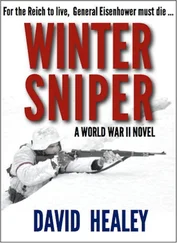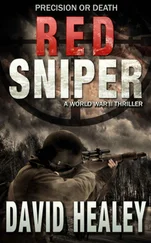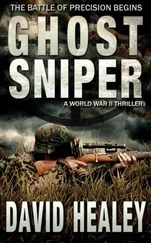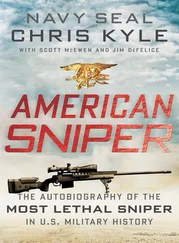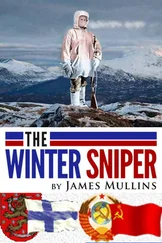Cole grinned at her. “Guess it ain’t that cold, after all. That’s some saying, though. And here I thought you Frenchies would be grateful, seeing as to how we liberated your country and all.”
Jolie turned serious. “We are grateful.” She shook her head. “I was also at Normandy, remember? So many dead.”
“I wonder how much gratitude a few thousand dead Americans buys. You think the French will still be grateful in ten years?”
“If you win this war, we will still be grateful in seventy years, or a hundred,” Jolie said. “But right now, we have to make sure the Germans do not return to Paris. So shoot some Germans now.”
“I’ll do what I can,” Cole said, putting his eye to the scope.
“I wish I had a gun,” she said.
“I gave my pistol to that kid,” he said. “You won’t be needing a gun. I’m goin’ to fire a few shots and then we high tail it for the hills.”
“They will come after us,” she said.
“Maybe, but I reckon they won’t try too hard. These bastards have got bigger fish to fry then catching a few snipers. And don’t worry, I got your back.” He gave her a look. “And your front. And just about any other area that needs covering, come to think of it.”
Jolie couldn’t help but smile. “It is good to know that not every part of you is frozen.”
“If we have to sit in this here field much longer, all bets are off on that.”
They did not have to wait long. The winter air already vibrated with the noise from the approaching German column. Tanks, trucks, assorted vehicles — more than a thousand German troops were moving through the woods. Because the Germans had to shout to be heard over the diesel engines, their voices carried clearly toward the waiting snipers.
“You speak Kraut. What are they saying?”
She cocked her head and listened. “Nothing important, just something about how it’s colder than a polar bear’s asshole.”
“For once, we can agree with the Krauts on something.”
Then the first vehicles emerged from the woods. A couple of smaller vehicles appeared first, followed by a truly massive tank. Cole recognized it as a King Tiger, which was a sort of battleship on land. The tank churned into the field and took up a position beside the road, swiveling its 88 mm gun across the field to cover the rest of the column. Even from this distance, the muzzle looked big enough to fit a watermelon. This was the closest he had been yet to a King Tiger tank.
“Holy shit,” Cole muttered.
He played his crosshairs over that iron behemoth, but the hatch of the King Tiger was not open, so there was no kind of target.
The Germans poured from the wood now like angry ants. He picked out another tank, this one with a German in goggles standing in the hatch. Cole breathed out, put his finger on the trigger, and fired.
The tank commander went down. Quickly, he picked out another target, the driver of one of those German jeeps. He hit the man, causing the car to veer off course into the field as the passenger clutched at the wheel in an effort to regain control.
One by one, the other snipers opened up. It was not a heavy fire, but it was a withering one. Much to the Germans’ credit, the sniper attack did not slow them down. After all, these were mostly veterans of the Eastern Front. They were well used to snipers. A few Germans deployed to counterattack.
Fortunately for the Americans, it was hard for the Germans to pick out their individual attackers. Looking across the fields, all they could see was a vast stretch of snowy landscape, punctuated here and there by stone walls and hedgerows. The grinding diesel engines drowned out the individual crack of the rifle shots. The Germans knew they were being shot at, but it was impossible to tell where the shots were coming from.
Cole fired again and winged a soldier standing ready at a machine gun mounted on the back of a German vehicle.
“A little to your left,” Jolie said, peering through the binoculars.
Cole worked the bolt and fired again, hitting him so solidly that the German somersaulted backwards off the vehicle.
It was all a little too easy, and Cole worried when things were easy — in his book easy didn’t last long, or worse yet, something with teeth and claws was sneaking up behind you.
He glanced to his right, where Rowe was located behind another stone wall similar to Cole’s. Rowe was alone, but he was picking out and shooting targets just like Cole. But Rowe was still new to being a sniper. So far the attack on the German column had the air of a Mason Lodge turkey shoot, and Rowe was caught up in the excitement, firing as fast as he could without giving enough thought to keeping behind cover.
“Keep your head down, you damn fool,” Cole muttered.
• • •
Von Stenger lay stretched out on the raised log, feeling the cold seep into him. He longed to tug his coat collar tighter to keep in as much body heat as possible, but the first rule of the sniper was to minimize any movements. Motion drew the opponent’s eye. Although he felt confident that he was well hidden, there was no point in tempting fate.
“Herr Hauptmann?” the driver whispered up. “What do you wish me to do?”
“When I want you to do something, I will tell you,” he said. “Now get down and don’t move a muscle.”
The driver did not have the patience of a sniper. He coughed softly once or twice, and even had the audacity to sneeze, which surely would have given away their position if there had not been a column of panzers churning through the woods and filling the air with a tumult of diesel engines and clanking tanks treads. There was no one in sight, so Von Stenger considered shooting the driver just for being annoying.
He ignored the fidgeting SS driver and kept his attention on the wintry field. At any moment, the enemy would reveal himself.
His predictions of an ambush had been correct. No sooner had the column emerged from the woods than the firing began. Friel’s men were met with a handful of well-placed shots, rather than a barrage of machine gun fire and mortars. Snipers, then.
He peered out across the field, trying to see where the shots originated. As Von Stenger knew from personal experience, locating a well-hidden sniper in a country landscape was like trying to find a flea on the belly of a shaggy dog.
He held his fire and watched. As he had often lectured his students at the SS sniper school, the chief skill of a sniper was not necessarily his ability with a rifle, but his capacity for patience. One had to wait out the enemy until he gave himself away with a sudden movement or even a muzzle flash.
Patience. Then accuracy.
Meanwhile, bullets continued to chew up the German ranks. But these were bullets, not bomb shells. In the end, a few snipers were just a nuisance to an armored column. Like bees on a bear. Like flies on das scheisse.
To his surprise, Friel came barreling up the road in another Schwimmwagen. Even from this distance, Von Stenger could hear him shouting. “Keep moving! Forward! Get going! Let the panzer finish them off.”
Bullets flicked around the commander, but Friel gave no sign of noticing. He really was a brave bastard, Von Stenger admitted. A real fire eater. Under Friel’s verbal lashing, the column ground forward, once again an unstoppable force, like a glacier of steel.
Von Stenger returned his attention to the field.
Instead of binoculars, he used his telescopic sight to explore likely sniper nests. A fallen tree. A notch in a stone wall. A hay rick.
There. A flicker of movement caught his eye. Near the foot of a haystack. He was not sure, but it might have been the motion of someone working a rifle bolt. The air was gray and gloomy, flecked with snow, but he was sure he saw something else — the telltale puff of warm breath on the winter air.
Читать дальше
